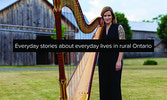By Lisa Boonstoppel-Pot
Lisa Thompson is not only the Ministry of Agriculture of Food and Rural Affairs, she’s also a self-confessed foodie who shared her favourite recipes in one of 24 inaugural stories for the newly launched People’s Archive of Rural Ontario (PARO).
Described as a living archive of rural Ontario that is widely accessible, ever-growing, online and a repository of multimedia stories, the PARO officially launched in November with a slate of speakers applauding the endeavour.
“We are really excited because it’s been a lot of time and thinking and collaboration to make a website that is easy to use, engaging, accessible and does justice to stories of people living in rural Ontario,” said Dr. David Borish, knowledge mobilization associate with PARO during the virtual launch.
Senator Rob Black agreed. “Time and time again I hear about the rural urban divide and the need for urban people to learn about rural culture. It’s high time the history of rural Canada is awarded the recognition it deserves,” said Black.
Thompson agreed to be interviewed by Owen Roberts for the repository. The story focuses on farming, food and her role as the agriculture minister. She shared three family recipes and the interview ranged from issues of rural migration to the role of rural Ontario in food production.
“Small town Ontario goes hand in hand with the agri-food system,” said the minister in her PARO story. “They depend on each other and need each other to succeed.”
PARO is the brainchild of the University of Guelph which has a history of teaching and promoting agriculture since 1874 when the government bought 550 acres from the Stone family to start a college of agriculture.
“We work in partnerships with committees and we are proud that we mobilize knowledge into action,” said Dr. Charlotte Rates, president and vice-chancellor of the University of Guelph. Deeply rooted to the prosperity and growth of rural Ontario, the launch of PARO by the university aligns with the overall mission of the university to improve life.
PARO describes itself as presenting stories that showcase the diversity of rural Ontario people, repair the gaps in knowledge about rural experiences, challenge unexamined assumptions, build bridges that bring people closer together and shed light on the ways choices impact ourselves and the people we depend on.
It has four key principles:
• Open access: PARO commits to extending the circulation of knowledge in accessible and understandable ways, and therefore ensures all of the audio-visual and written content within the archive is open to everyone online , free of cost or other barriers to engaging with this work.
• Aligned with rural needs: PARO is focused on supporting the recovery, preservation, and resilience of rural Ontario, and aims to be a flexible initiative, with evolving practices and efforts in response to the changing priorities and needs of people and communities in this region.
• Diversity and equity: PARO is all about highlighting and celebrating the diversity of rural Ontario, and is dedicated to amplifying stories across different ages, races, sexual orientations, socio-economic statuses, abilities, and religious beliefs.
• Privileging rural voices: PARO is meant to be a platform that supports rural representation, and so the focus is to highlight rural stories, experiences, perspectives, and voices in ways that are meaningful to the people of this region.
PARO was modelled after a similar venture in India called the People’s Archive of Rural India (PARI) whose founder, Dr. P. Sainath, spoke virtually at PARO’s launch. He said people have great romantic notions of famous libraries such as the library of Alexandria. However, these libraries were not free and open. They largely excluded most of society. In his own country of India, Sainath said the Brahma caste had lists of punishments for people of lower castes who listened to their sacred texts. “Punishments included having hot iron nails placed on their tongues or having their eyes gouged out. That is how leaders kept a monopoly over knowledge.” Most archives have been a repository of protected privilege.
PARI is meant to be the exact opposite.
“We need archives that are controlled neither by the government nor by corporations. There is a need for a people archive based on a concern with everyday lives or everyday people that cannot be taken down by someone else and cannot be declared classified information,” said Sainath.
It will be very important for PARO to remember to credit every writer, every subject and every person involved in the stories. Also, to record stories from many angles, even if the writer does not agree with the angle. Moreover, to publish in multiple languages.
Students at the University of Guelph curated the first 24 stories and in sharing their experience, one writer expressed that he learned rural Ontaro is more diverse and resilient than he imagined. Another writer said she learned the importance of creating an interesting narrative and how to work together with someone to create a story they were both proud of.
The PARO website can be found at https://www.ruralontario.org/. Click on the stories tab to find the story on Lisa Thompson along with the other rural repository stories. ◊


